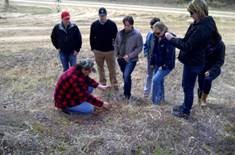The history of Indigenous Peoples in Canada and other parts of the world can be described as a challenge to maintain a strong cultural identity and achieve social acceptance within colonial societies. I was lucky to have artists for parents who had a great appreciation for Indigenous art and craftsmanship, history and culture. This exposure created a curiosity that led me to learn more through undergraduate courses, books and adventures. During these studies, I gained a new respect for the complex and rich cultural diversity of Indigenous Peoples.
Over the last 15 years, I have had the opportunity to engage and work directly with Indigenous groups in Canada. These experiences have been the most rewarding for me, not because of what I learned or how we made a project better together, but because I saw colleagues and clients grow in their knowledge and appreciation of Indigenous groups.
As a company that works alongside Indigenous communities, we play an important role in advancing the nation-to-nation relationship. Whether our scope of work involves upfront planning, regulatory processes, detailed design, construction or ongoing monitoring, building respectful relationships with Indigenous communities and integrating Indigenous Peoples into project delivery is essential.
This integration is something that continues to evolve. Expectations and regulations to include Indigenous involvement in projects have all evolved. No longer is Indigenous participation a check box approach to meet government requirements for consultation. The adequacy of Indigenous consultation is increasingly under scrutiny. Many project proponents expect Indigenous participation at all project phases and this participation itself is evolving from basic consultation regarding priorities, concerns and employment to shared visions of the project, active participation in regulatory processes, and economic development opportunities including shared ownership of investments. At the same time, Indigenous communities rightly expect a higher level of participation in development, regulatory processes and government decisions.
Set out in our Resilient World sustainability strategy, our long term goal for project delivery is to ensure that we respond to our customers and other stakeholders’ demands for high standards by embedding a consistent sustainability standard across our projects, fundamental to this is how we interact and deliver projects within Indigenous communities through initiatives such as our Indigenous Business Initiative. At the foundational level, we are closing the gaps in knowledge, experience and relationships. At the business level, we are seeking opportunities to work directly for and with Indigenous communities and companies to provide our core services. We also continue to enhance our ability to respond to proponent requirements for direct Indigenous participation, which may take the form of employment, training, partnerships or subcontracts, or other mutually beneficial means. The engagement that we undertake on behalf of our customers is based on building mutually respectful relationships. We are seeking to increase the number of Indigenous employees at Amec Foster Wheeler and we continue to provide training about Indigenous history, culture, rights and current issues in Canada.
In Canada, June is National Aboriginal History month and 21 June is National Aboriginal Day. I encourage everyone, no matter where you live, to learn more about Indigenous Peoples in your country. Collectively, our steps will support reconciliation.


